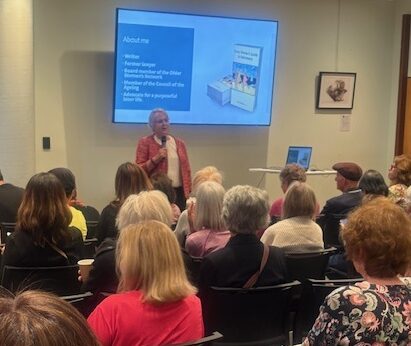 It was a very engaged crowd at the Five Dock library on 12 November. Everyone had a lot to say about the numerous complications that can arise when we get our affairs in order and prepare to simplify things for those people left behind.
It was a very engaged crowd at the Five Dock library on 12 November. Everyone had a lot to say about the numerous complications that can arise when we get our affairs in order and prepare to simplify things for those people left behind.
Tag: #everywomansguide
Seen at the Older Women’s Network Biscuit Day
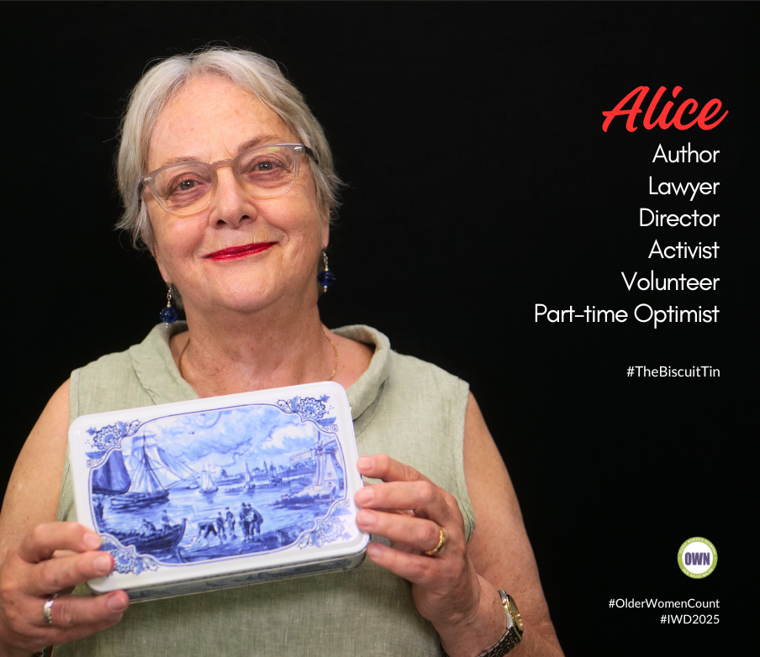
Decluttering – or the art of having less stuff.
Giving a talk at the Nepean-Hawkesbury VIEW Club on 17 June 2024.
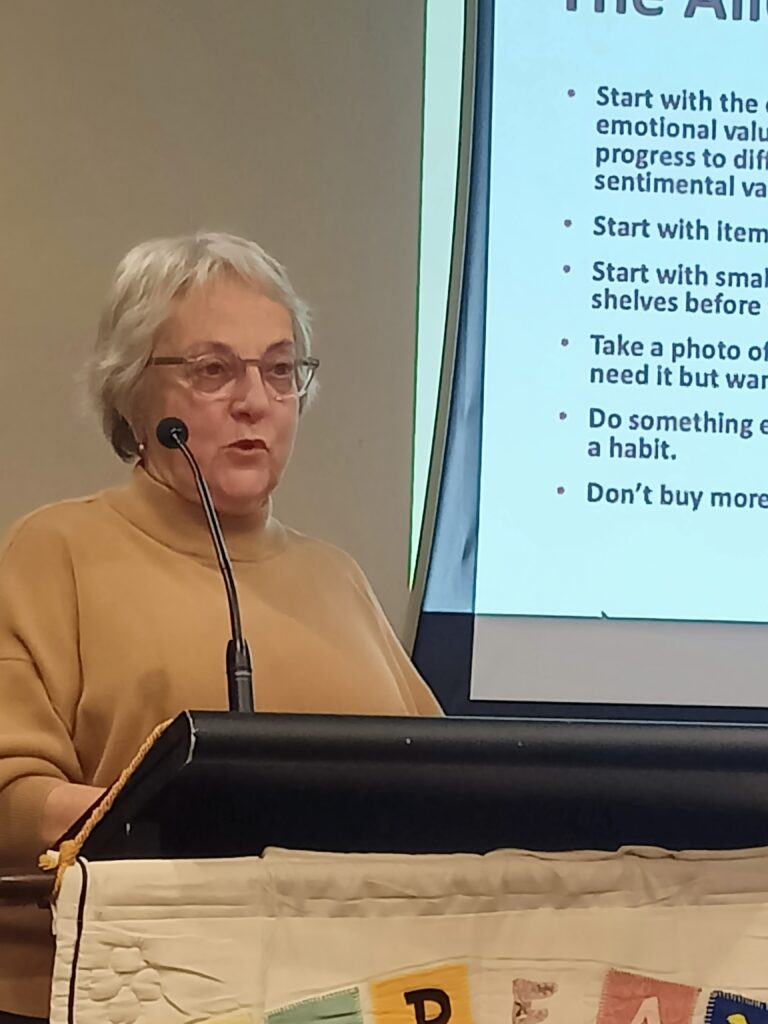
Separated? Why you need to review your Will
Scanlan Carroll Lawyers, Carol Pagès
If you have recently separated, your focus will likely be on what to do about the property you have with your ex partner, and arrangements for your children.
So why do you need to think about your Will?
If you have a Will, it may be that each of you and your ex partner have left everything to each other, and then to your children.
If you are separated, it is important to take the time to review all of your estate planning documents – this includes your Will, your Powers of Attorney, and your Binding Death Benefit Nomination of your superannuation fund.
Each of these documents is explained below:
Your Will – your Will sets out how you would like your assets distributed when you die and who is responsible for carrying out your wishes. You can also include clauses such as your nominated guardian for children under 18, and specific gifts that you would like to make. In your Will you specify who will be your executor. Your executor stands in your shoes when you die, and they will carry out your wishes by calling in your assets and distributing same to your chosen beneficiaries.
Enduring Power of Attorney – While you are alive, your attorney is able to stand in your shoes and carry out financial transactions on your behalf using the power – this can be buying or selling property on your behalf if you are away on holidays, transacting on your bank account paying your bills for you, and so on. Your nominated attorney can also make personal care decisions for you – such as choosing a care facility if you are unable to look after yourself, or limiting or restricting a person from visiting you if they consider this is not in your interests.
A separate medical decision maker (which can be the same person) will be able to make medical decisions on your behalf, such as consenting to surgery if you are unable to. As the powers are enduring, they continue even if you later suffer an illness or injury which means you are unable to make decisions for yourself.
Binding Death Benefit Nomination (BDBN) – many people have significant balances in superannuation and also life insurance policies attached to their funds. As part of your estate planning process, we provide you with advice about your BDBN as superannuation is generally considered to be ‘outside’ of your estate and what is covered by your Will. It is important that this valuable asset is passed on to your loved ones in the way that you intended.
Why is this important?
Separation does not trigger the end of your existing Will, Powers of Attorney or BDBN. Many people are surprised to learn that divorce does not invalidate your Will. Divorce revokes a gift to your former spouse or appointment as your executor, and remarriage can invalidate your Will save for references made to your current spouse.
What if I don’t have a Will?
If you don’t have a Will, your assets will be passed on to your relatives according to the rules of intestacy. The rules in Victoria are that if you die, your estate goes to:
Your spouse or domestic partner if you have no children;
Your spouse or domestic partner, if you have children with that partner;
If you have children to a previous relationship, your spouse will receive a statutory legacy (currently $480,700), your personal possessions, and 50% of the balance of your estate. Your children will equally share the remaining 50% of your estate.
Case study – who inherits?
Alex separated from Danielle three years ago. They were married however had no children. They were able to resolve their family law property division fairly amicably, and finalized their family law case with Consent Orders dividing their property.
Alex and Danielle prepared their Wills when they were first married 10 years ago, each leaving their estate to the other.
Alex has re-partnered with Mary, and they have been together for 20 months.
Alex and Danielle haven’t yet filed for divorce as they have not gotten around to it yet. Alex has the forms on the kitchen table to sign.
Alex tragically dies before signing his divorce form.
Who do Alex’s assets go to………..?
Depending on a number of factors – it’s Danielle – his former wife.
The gifts to Danielle in Alex’s Will are not revoked as they are not divorced.
If Alex owned property such as a house with Mary, and the house was in joint names – the house would be outside of Alex’s estate and pass straight to Mary.
What if Alex didn’t have a Will?
Based on the length of the relationship with Mary (along with several other factors which would need to be taken into account under the Family Law Act 1975 (Cth)), Mary is not likely to be considered a spouse.
Danielle is still Alex’s legal spouse, as they are not divorced, so Danielle receives Alex’s estate.
Summary
Mary may have grounds to make a claim in either scenario, but this can be a long and expensive legal process which no one wants to go through after the loss of a loved one.
The above example shows that how an asset passes on after death can depend on a number of factors. To ensure that your wishes are as you intended, it is important to obtain advice in relation to your family law and estate planning matters.
This is important at separation, and the time following separation – for example, when you re-partner, it is worth considering the impact of your new relationship and property ownership upon your children, and your new partner.
Find your new opportunities
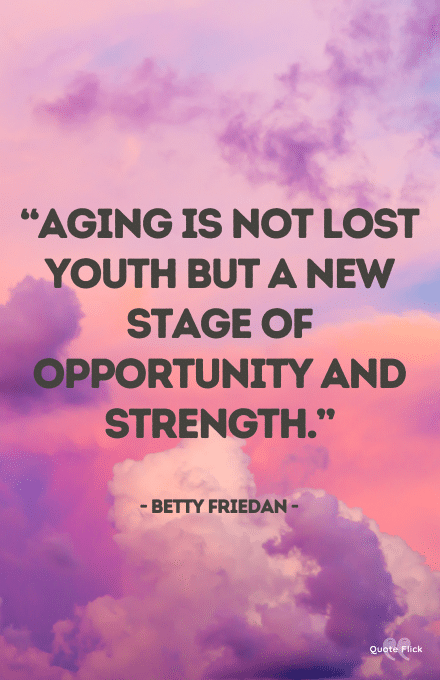
Exchanging ideas about retirement
One rainy afternoon at the Dennis Johnson library, Stanhope Gardens. This group of women had plenty of experiences to discuss. 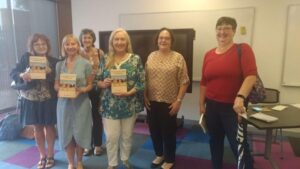
Isolate and thrive
By Alice Mantel
In this uncertain period, we may have increased the physical distance between each other but we can still be socially connected. It might just require more motivation (and self-discipline to use the words of one very important person).
Here are my suggestions about how to make the most of this enforced retreat from the busy world:
Daily rituals – find a special way to welcome the morning, or the approaching night, perhaps just by paying attention in silent stillness.
Enjoy the solitude – doing things that you like, You could read a book (including downloading a digital version from your library), listen to podcasts, play loud music, take up an instrument you have ignored for a while, flip through photo albums or dance while no one is watching. You could even write your memoirs.
Connect with others – call friends and contacts, by phone or with video calls, or celebrate your special days by hosting an online party. Do a jigsaw puzzle with a family member. Call Lifeline on 13 11 14 if you don’t feel in control of your mental stress or anxiety.
Share – your recipes, your patterns, your ideas – through a curated social media diet or a blog your own thoughts. Use digital media to stay informed.
Create something new – take up painting, sewing, pottery making, knitting again. Find a live streamed class to join. Cook new meals or cakes that you have always wanted to try.
Develop your sense of purpose – reach out and support your neighbours, your school, or disadvantaged groups by volunteering, donating money or following their media posts.
Revise and re-evaluate the obvious – what is in your cupboards, your bookshelves, your kitchen pantry, or your bottom drawers?
Stay active – participate in online classes like yoga or dance classes, walk/run in the fresh air in local parks, breathe deeply on your balcony, set up a home gym using items found around your home, or take up golf or tennis.
Care for yourself – catch up on some sleep, rationalise your old clothes, give yourself an organic facial, throw out old makeup, dress to impress yourself.
Go gardening – pruning, weeding, planting, reorganising your pot plants, buying more plants, mulch and fertilise.
Avoid– non-essential online shopping, too much couch time watching streamed movie marathons, and drinking more alcohol to pass the time.
In conversation in Albury
Introducing Every Woman’s Guide to Retirement